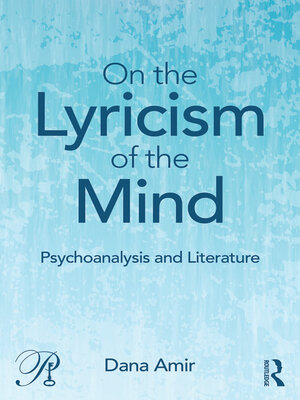On the Lyricism of the Mind
ebook ∣ Psychoanalysis and literature · Psychoanalysis in a New Key
By Dana Amir

Sign up to save your library
With an OverDrive account, you can save your favorite libraries for at-a-glance information about availability. Find out more about OverDrive accounts.
Find this title in Libby, the library reading app by OverDrive.



Search for a digital library with this title
Title found at these libraries:
| Library Name | Distance |
|---|---|
| Loading... |
On the Lyricism of the Mind: Psychoanalysis and Literature explores the lyrical dimension (or the lyricism) of the psychic space. It is not presented as an artistic disposition, but rather as a universal psychic quality which enables the recovery and recuperation of the self. The specific nature of human lyricism is defined as the interaction as well as the integration of two psychic modes of experience originally defined by the psychoanalyst Wilfred Bion: The emergent and the continuous principles of the self.
Dana Amir elaborates Bion's general notion of an interaction between the emergent and the continuous principles of the self, offering a discussion of the specific function of each principle and of the significance of the various types of interaction between them as the basis for mental health or pathology. The author applies these theoretical notions in her analytic work by means of literary illustrations showing how the lyrical dimension may be used to teach psychoanalytic readings of literature and explore the connection between psychoanalytic and literary languages.
On the Lyricism of the Mind presents a new psychoanalytic understanding of the capacity to heal, to grieve, to love and to know, using literary illustrations but also literary language in order to extract a new formulation out of the classic psychoanalytic language of Winnicott and Bion. This book will appear to a wide audience to include psychoanalysts, psychotherapists and art therapists. It is also extremely relevant to literary scholars, including students of literary criticism, philosophers of language and philosophers of mind, novelists, poets, and to the wide educated readership in general.







